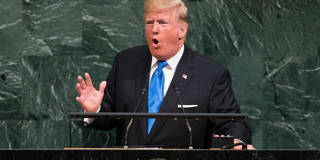Is Donald Trump reviving the "madman theory" of diplomacy, introduced by Richard Nixon to instill fear in America's adversaries? North Korean leader Kim Jong-un's description of Trump as "mentally deranged" suggests that such a ploy might be working – or else Kim is more right than he, or the rest of us, would like.
MOSCOW – In the 1970s, US President Richard Nixon instructed Secretary of State Henry Kissinger to convince the leaders of hostile communist countries that he could be erratic and volatile, particularly when under pressure. Kissinger, a shrewd practitioner of Realpolitik, saw the potential in this approach, which he readily implemented. With that, the “madman theory” of diplomacy was born.

MOSCOW – In the 1970s, US President Richard Nixon instructed Secretary of State Henry Kissinger to convince the leaders of hostile communist countries that he could be erratic and volatile, particularly when under pressure. Kissinger, a shrewd practitioner of Realpolitik, saw the potential in this approach, which he readily implemented. With that, the “madman theory” of diplomacy was born.